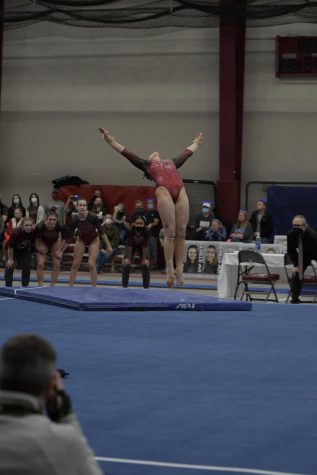Subjectivity scores high on impact
In judged athletic competitions, subjectivity plays a huge role in the athlete’s score and experience.
April 27, 2022
In many sports, there are clear lines of what is in and what is out, or what qualifies for a point and what was a missed attempt; however, in some athletic competitions, the lines are a little flexible. Subjectivity infiltrates sports like diving and gymnastics, those athletes’ scores lie in the hands of a judge, not a scoreboard.
“While there is a clear cut code of points to be used by judges, it still allows gymnastics officials room for discretion while judging a routine,” Katie Kalland, a senior on the gymnastics team, said. “Experienced judges who judge what’s in front of them rather than judging based on which team is competing or past successes or failures.”
In order to become a college athletics judge, you have to take a test. If you score high enough, you are technically qualified to become a judge. After you get past the initial test, you have to continue to test your knowledge every four years.
Each person has a different interpretation of what a perfect score is.
“The entire judging system for my sport is based on the judge’s subjectivity and discretion. There are set guidelines on how a dive should generally be scored but at the end of the day no two judges are going to see the exact same issues with a dive and score it the same way,” junior diver Courtney Broyles said.

No two meets are the same either, there is always a new set of judges. With a new set of judges comes new sets of opinions.
“[A dive] can have such an array of scores that sometimes it is unclear how my dive actually scored,” Tony Van Sambeek, a sophomore diver, said.
While competing in a judged event, all eyes are on the athlete, and these athletes know that. Athletes have complained of being hyper focused on the judges rather than the task at hand.
“Sometimes… in the big meets that is the main thing I am worried about,” Van Sambeek said.
Beyond the score, the subjectivity ranges farther than the scoring.
“Gymnastics has impacted every aspect of my life… you are constantly evaluated on your looks, body shape, technique, and artistic and athletic ability,” said Kalland.
For these college athletes, judged events have been in their lives for so long that the scoring element does not impact them anymore.
“I’ve been competing in judged competitions my whole life at this point so I couldn’t really tell you,” said Broyles.
Subjectivity in sports causes many repercussions. There are layers of the score and the impact that a judge can make on an athlete outside of the competition zone. One can never know how prepared or fair a judge is going to be on any given day, all one can do is hope.
